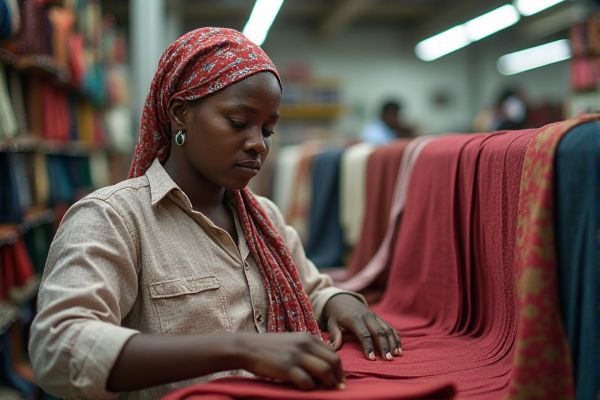
Ethiopia's textile industry presents numerous job opportunities, driven by the country's rich cultural heritage and competitive labor costs. The government encourages foreign investment through incentives and a growing number of industrial parks dedicated to textile manufacturing. Skill development programs are in place to enhance the workforce's capabilities, focusing on sustainable practices and innovative techniques. Key roles in production, design, quality control, and supply chain management are increasingly in demand as businesses seek to meet global standards.
Job Description
Ethiopia's textile industry offers diverse job opportunities, ranging from production and quality control to design and marketing. As the country focuses on expanding its manufacturing sector, a skilled workforce is essential to meet international standards and demands. Positions may include roles in weaving, dyeing, and finishing textiles, where attention to detail and technical skills are crucial. Your contributions in this growing field could support Ethiopia's economic development and position the nation as a key player in global textiles.
Requirement
Textile jobs in Ethiopia typically require a relevant educational background, such as a degree in textile engineering or fashion design. Practical experience in manufacturing processes, quality control, and textile technology is often essential for candidates seeking employment in this growing industry. Proficiency in computer-aided design (CAD) software and an understanding of sustainability practices can enhance your job prospects. Strong communication skills and the ability to work in a team-oriented environment are also highly valued by employers in Ethiopia's textile sector.
Salary and Perks Expected
Textile jobs in Ethiopia offer a range of salaries depending on the specific role, experience level, and the employer. Entry-level positions typically start around 5,000 to 10,000 Ethiopian Birr per month, while more experienced professionals can earn between 15,000 to 25,000 Birr and above. Employees may also benefit from perks like health insurance, transportation allowances, and performance bonuses, which enhance overall compensation. The textile industry in Ethiopia is growing rapidly, providing numerous opportunities for skill development and career advancement.
Similar Job Names
- Textile Engineer
- Production Manager
- Quality Control Inspector
- Fashion Designer
- Textile Chemist
- Pattern Maker
- Weaving Technician
- Dyeing Technician
- Garment Technologist
- Merchandiser
- Textile Designer
- Knitting Operator
- Sewing Machine Operator
- Supply Chain Coordinator
- Fabric Sourcing Specialist
- Textile Production Supervisor
- Sales Representative
- Research and Development Specialist
- Technical Sales Engineer
- Compliance Officer
Job Expectation Concept
Textile jobs in Ethiopia are increasingly in demand due to the country's burgeoning garment industry. Skilled labor is essential, with roles ranging from production line workers to quality control specialists. You may find opportunities in both local factories and international brands looking to establish a presence in Ethiopia. The government's support for investment in the textile sector enhances job security and growth potential for employees.
Career Advantage and Weakness
The textile industry in Ethiopia offers significant career advantages, including a growing demand for skilled labor and opportunities for entrepreneurship. With government initiatives aimed at boosting exports, you can benefit from job stability and potential salary growth in this sector. However, challenges such as limited access to advanced technology and training can hinder professional development. Understanding these factors can help you navigate your career path effectively in Ethiopia's evolving textile landscape.
Important Thing Must Know
Textile jobs in Ethiopia are increasingly significant due to the country's growing garment manufacturing sector. The Ethiopian government has invested heavily in establishing industrial parks, which attract both domestic and foreign companies. These parks create numerous employment opportunities, particularly for young workers seeking stable jobs. Skills training programs are also being expanded, enhancing the employability of individuals in the textile industry. Understanding the local workforce landscape and labor rights can empower you to make informed choices about potential job opportunities in this vibrant sector.
Alternative Career Options
Ethiopia's textile industry offers a variety of career opportunities beyond traditional roles in manufacturing and design. You can explore areas such as textile marketing, where skills in business development and brand strategy are crucial for promoting local products globally. Sustainability and eco-friendly practices are gaining momentum, presenting roles in textile recycling and sustainable sourcing to meet environmental standards. Furthermore, digital technologies are transforming the industry, creating demand for professionals in e-commerce and digital marketing tailored to the textile sector.
Companies List
- Awash Textile Factory
- Ethiopia Textile and Garment Manufacturers Association
- Hawassa Industrial Park
- EPHI Textile and Garments
- H&M Group Suppliers in Ethiopia
- Dashen Brewery (involved in textile initiatives)
- Shashemene Garment Factory
- Ethio-Asian Industries PLC
- Kombolcha Textile Factory
- Adama Industrial Park Testimonial Companies
List of Ideal City
Ethiopia boasts several cities known for vibrant textile industries, offering numerous job opportunities. Addis Ababa, the capital, hosts many textile manufacturers and international companies seeking skilled labor. Hawassa has become a growing hub for garment production, attracting both local and foreign investments. Additionally, cities like Mekele and Dire Dawa are expanding their textile sectors, creating an increasing demand for qualified professionals in the field.
 jobs-ethiopia.com
jobs-ethiopia.com